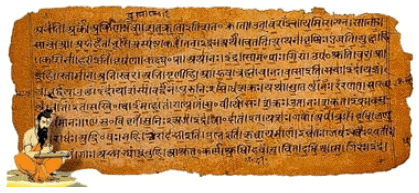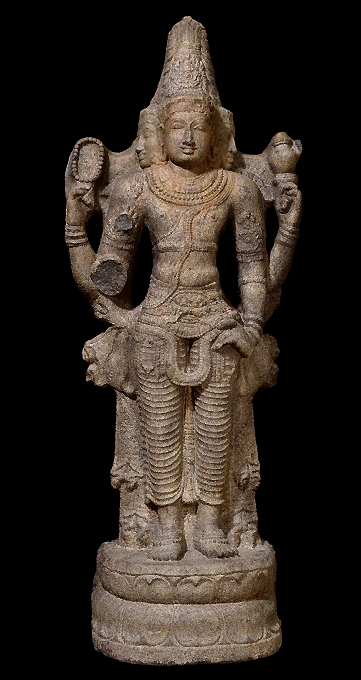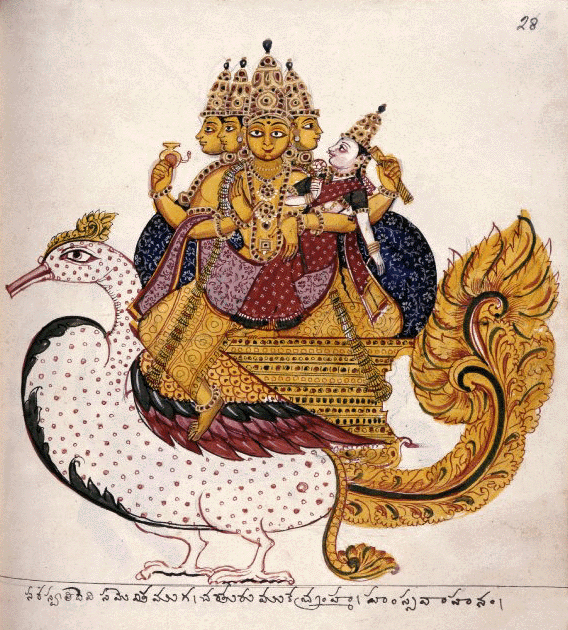
|
|
|
|
The Purusa-sukta is found in the Rg Veda, as the 90th Sukta of its 10th mandala, with 16 mantras. Later, it is seen in the Vajasaneyi Samhita of the Sukla Yajur Veda, the Taittiriya Aranyaka of the Krisna Yajur Veda, the Sama Veda, and the Atharva Veda, with some modifications and redactions. In South India, the Purusa-sukta, Visnu-sukta, Sri-sukta and Narayana-sukta are generally chanted together in parayana. The Sri Rudra, Purusa-sukta, Upanisads, the Gita, and the Visnu Sahasra Nama are also recommended for daily parayana - chanting. Since the Purusa Sukta is seen in all Vedas, it is cited in the Mahabharata (Mokshadharma Parva 351 and 352) as being the essence of all srutis by Veda Vyasa. Saunaka, Apastamba and Bodhayana have also written concerning the use of the Purusa-sukta. Among Puranic texts, the Sukta has also been elaborated in the Bhagavata Purana (2.5.35 to 2.6.1-29). Vedantic interpretation of the Purusha Sukta generally interprets it as being an exposition on the principles of approaching (upasana), knowledge (jnana), devotion (bhakti), and rituals and duties (dharma and karma). Because the Suktam is composed in early Vedic Sanskrit, as opposed to Classical Sanskrit, it is considered difficult to understand by way of literal interpretation.

Rg Veda
The Purusa in the title of the Purusa-sukta refers to the Parama Purusa, Purusottama, Narayana, in his form as the Virat Purusa. He was the source of all creation. It describes this form of His as having countless heads, eyes, legs, manifested everywhere, and beyond the scope of any limited method of comprehension. All creation is but a fourth part of Him. The rest is unmanifested. Purusa as Brahma remained inactive, and Aniruddha Narayana (Garbhodakasayi), one of the four aspects of Narayana in the first tier at the base of the Visva Rupa, asked him "Why do you do nothing?" "Because of not knowing," Brahma replied. "Perform a yajna. Your senses, the devas, shall be the ritviks (priests). Your body shall be the havis (offering). Your heart, the altar. And I shall be He who enjoys the havis. From your body sacrificed, shall you create bodies for all living creatures, as you have done in kalpas before this." Thus says the Sakalya Brahmana. This yajna was called "sarvahuta", the offering of all. The act of creation itself grew out of yajna, the rite of sacrifice. Who was worshiped at this sacrifice? It was the Purusa. Who performed it? Brahma, the creative aspect of the Purusa. Who were the ritvik priests? The devas, who are the Purusa's senses. Who was tied as the beast of the sacrifice? Brahma, again. What was barhis, the altar of the sacrifice? All of nature. Who was the fire? The Purusa's heart. What was sacrificed? Again, the Purusa himself, his great body that contained all of creation. From this sacrifice did all of creation emanate. This is central to the message of the Purusa-sukta.
"This great Purusa, brilliant as the sun, who is beyond all darkness, I know Him in my heart. Who knows the Purusa thus, attains immortality in this very birth. I know of no other way to salvation."
T. Venkatacharya presents a translation and interpretation of Purusa Shukta, in which he asserts that the word Virat refers to the primordial nature (Prakriti) out of which the universe is created. The word Purusha, occurring in the hymn, when it stands alone without any adjective, should be understood in the sense of the four-faced creator, Brahma. But if it is qualified by an adjective, as in Mahantam Purusham or Sahasrasirsha Purushah, then it refers to the Supreme Being.
The act of srishti (creation) mentioned is, he suggests, not to be taken literally, but rather as an act of deep meditation. Likewise, the word yajna (sacrifice) should not be taken to involve the sacrifice of any animal, as is generally understood. The Rishi who "saw" this hymn was Narayana, the Supreme Being, but Venkatacharya suggests that one should distinguish the seer Narayana from God Narayana. In this regard he points to Verse 16, which says, "I know this Supreme Person... ", which the author sees as being in support of this view.
Excerpts from an article by Sri V. Sundar

Lord Brahma Chola sculpture in granite, c. 1050 Om taccham yoravrini mahe gaatum yajnaya gaatum yajnapataye daivi svastirastu naha svastir maanushebhyaha urdhvam jigatu bheshajam sham no astu dvipade sham chatushpade Om shantih shantih shantihi We worship and pray to the Supreme Lord for the welfare of all beings. May all miseries and shortcomings leave us forever so that we may always sing for the Lord during the holy fire ceremonies. May all medicinal herbs grow in potency so that all diseases may be cured. May the gods rain peace on us. May all the two-legged creatures be happy, and may all the four-legged creatures also be happy. May there be peace in the hearts of all beings in all realms. Om sahasra shirsha purushaha sahasrakshaha sahasrapat sa bhumim vishvato vritva atyatishthad dhashangulam The Purusha (the Supreme Being) has a thousand heads, a thousand eyes and a thousand feet. He has enveloped this world from all sides and has (even) transcended it by ten angulas or inches. purusha evedagam sarvam yadbhutam yaccha bhavyam utamritatva syeshanaha yadanne natirohati All this is verily the Purusha. All that which existed in the past or will come into being in the future (is also the Purusha). Also, he is the Lord of immortality. That which grows profusely by food (is also the Purusha). etaavaanasya mahima ato jyaayagamshcha purushaha paadosya vishvaa bhutaani tripaadasyaamritam divihi So much is His greatness. However, the Purusha is greater than this. All the beings form only a quarter (part of) Him. The three-quarter part of His, which is eternal, is established in the spiritual domain. tripaadurdhva udaitpurushaha padosyeha bhavatpunaha tato vishvajya kramat sashana ashane abhi The Purusha with the three-quarters (of His energy) ascended above (the spiritual energy). His one quarter of material energy becomes this creation again (and again). Then He pervades this universe comprising a variety of sentient beings and insentient objects. tasmad viraadajayata viraajo adhi purushah sa jaato atyarichyata pashchaad bhumimatho puraha From Him (the Adipurusha or original Supreme Being) was born the Virat (or Virat Purusha, the immense universal form). Making this Virat as the substratum (another) purusha (or being, Brahma) (was born). As soon as he was born, he multiplied himself. Later, he created this earth and then, the bodies (of the living beings). yatpurusheNa havisha devaa yajnam atanvata vasanto asyasidajyam grishma idhmash sharaddhavihi When the devas (the demigods or beings of light) performed a yajna (or sacrificial ritual), using the Purusha as the havis (sacrificial material) for the yajna (ritual), the Vasanta (spring) became the ajya (ghee), the Grishma (summer) served as idhma (pieces of wood) and the sharad (autumn) filled the place of havis (oblatory material like the purodasha or rice-cake). saptasyasan paridhayaha trissapta samidhah kritaha devaa yadjajnam tanvanaha abadhnan purusham pashum For this (yajna or spiritual ceremony) there were seven paridhis (fuel pieces serving as borders). And, twenty-one items were made the samit or sacrificial fuel sticks. When the devas were performing this yajna or ceremony, they tied the purusha (himself) as the pashu (sacrificial animal). tam yajnam barhishipraukshan purusham jatamagrataha tena deva ayajantaha sadhyaa rishayashchaye The devas, the sadhyas and the rishis performed the sacrifice by using that Purusha as the means of yajna, the Purusha who had been born in the beginning, after sprinkling him with water by the barhis (or sacrificial grass). tasmad yajnat sarvahutaha sambhritam vrishadajyam pashugamstya gashchakre vayavyan aranyan gramashcaye From that yajna (or sacrificial ritual) wherein the Cosmic Being was Himself the oblation, was produced the prasajya (or curds mixed with ghee). Birds flying in the air, wild animals of the forest as also the domesticated animals of the villages were also produced. tasmad yajnat sarvahutaha richassamani jijignire chandhagamsi jijignire tasmaat yajus tasmaad ajaayata From that yajna (or sacrifice) wherein the Cosmic Being was Himself the oblation, were born the riks (the mantras of the Rig-veda) and the samans (the mantras of the Sama-veda). From that (yajna) the metres (like Gayatri) were born. From that (yajna again) the yujas (the Yajur-veda) was born. tasmaadashva ajayata ye ke Cobhaya dataha gaavo ha jijignire tasmat tasmad jnata ajavayaha From that were born the horses, as also animals (like donkeys and mules) which have two rows of teeth. From that were born the cattle. From that (again) were born goats and sheep. yatpurusham vyadadhuhu kadhita vyakalpayan mukham kimasya kau bahu kaavuru padavuchayate (Now some questions are raised by the sages:) When the gods decided to (mentally) sacrifice the Viratpurusha (and produce further creation), in how many ways did they do it? What became of his face or mouth? What became of his two arms? What became of His two thighs? What were (the products of) the two feet called? brahmanosya mukhamasit bahu rajanyah kritaha uru tadasya yadvaishyaha padhyagam shudro ajayata From His face (or the mouth) came the brahmanas. From His two arms came the rajanya (the kshatriyas). From His two thighs came the vaishyas. From His two feet came the shudras. chandrama manaso jataha chakshoh suryo ajayata mukhad indrash chagnishcha pranadvayur ajayata From His mind was born the moon. From His two eyes was born the sun. From His mouth were born Indra and Agni. From His breath was born the air. nabhya asidanta riksham shirshno dyauh samavartata padhyam bhumirdishash shrotrat tatha lokagamm akalpayan From (His) navel was produced the antariksha (the space between the earth and the heavens). Dyuloka (or heaven) came into existence from His head. The bhumi (the earth) evolved out of His feet, and deek (or spacial directions) from His ears. Similarly (the demigods) produced the worlds (too). vedahametam purusham mahantam adityavarnam tamasastu pare sarvani rupani vichitya dhiraha namani kritva abhivadan yadaste "I know (through intuitive experience) this great Purusha (the Supreme Being), the wise one, who, having created the various forms and the nomenclatures (for those forms), deals with them by those names, and who is beyond darkness and is brilliant like the sun." dhata purastadya mudajahara shakrah pravidvan pradishashcha tasraha tamevam vidvan amrita iha bhavati nanyah pantha ayanaya vidyate In the ancient days, Prajapati (Brahma) praised Him. Indra who knows all the four quarters also spoke about Him. Anyone who knows Him thus, will become immortal even in this life. For attaining liberation there is no other path (than knowledge of this Purusha, the Supreme Lord). yajnena yajnam ayajanta devaha tani dharmani pradhamanyasan te ha nakam mahimanas sacante yatra purve sadhyah santi devaha The (demi)gods worshiped (the Supreme Creator in the form of) yajna through yajna (sacrifical ceremonies). Those very processes became the primary dharmas (laws guiding humanity). Those great ones attain that heaven where the ancient devas (demigods) and sadhyas live. adbhyas sambhutah prithivyai rasacca vishvakarmanas samavartatadhi tasya tvashta vidadhad rupameti tatpurushasya vishvamajanamagre The Viratpurusha manifested from out of (the all-pervading) water as also the essence of the element of earth with the help of viswakarma, the Creator. This Viratpurusha was named as tvashta(who is equal to the viswakarma) The (Paramapurusha, known as) Tvashta engaged Himself in the act of creating (the fourteen planetary systems), (which form of the expanded) figure (of the Viratpurusha). (Thus) the entire creation (related to the Viratpurusha) came into existence in the very beginning of creation. vedahametam purusham mahantam adityavarnam tamasah parastat tamevam vidvan amrita iha bhavati nanyah pantha vidyate'yanaya "I have known that great Purusha (Supreme Being) who is brilliant like the sun and who is beyond all darkness. One who knows Him thus becomes immortal (even) here. There is no other path for liberation than this." prajapatishcharati garbhe antaha ajayamano bahudha vijayate tasya dhirah parijananti yonim marichinam padamicchanti vedhasaha Prajapati (the Supreme Creator) moves inside the cosmic womb. (Though) unborn He takes birth in a variety of ways. The wise ones know His (real nature) as the origin (of the universe). The (secondary) creators desire to attain the positions of Marichi and others. yo devebhya atapati yo devanam purohitaha purvo yo devebhyo jataha namo ruchaya brahmaye Obeisances to Him, the self-luminous Brahman, who shines for the (demi)gods, who is the leader of the rituals of the gods and who was born even before the gods. rucham brahmam janayantaha deva agre tadabruvan yastvaivam brahmano vidyat tasya deva asanvashe In the beginning of creation, the gods, manifesting the light of Brahman, addressed Brahman thus: "That brahmana who realizes (You) thus, all the gods will come under his control." hrishcha te lakshmishcha patnyau ahoratre parshve nakshatrani rupam ashvinau vyattam ishtam manishana amun manishana sarvam manishana Om shanti shanti shantihi O Purusha! The goddesses Hri (modesty) and Sri (Lakshmi, wealth) are Your consorts. Day and night are Your lateral limbs. The stars are Your form. The Ashvins are your widely opened (mouth). (O Purusha) fulfill our desire for self-knowledge as also our desire for the enjoyments of this world (like longevity, cows, and horses). Give us all that we need. Om, let there be peace, peace, peace.
| |
